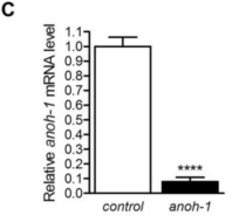 Authors of a paper on the origin and function of a family of transmembrane proteins have retracted it after an investigation at the University of Florida revealed that an author had falsified some results.
Authors of a paper on the origin and function of a family of transmembrane proteins have retracted it after an investigation at the University of Florida revealed that an author had falsified some results.
This is the third paper with falsifications that Chi Leung, a former UF postdoc, is responsible for; this summer, we reported on a retraction and a partial retraction of two other papers on which Leung was a co-author. The case is currently under investigation by the U.S. Office of Research Integrity National Science Foundation, a UF spokeswoman tells us.
The problems in the paper, “Phylogenetic, expression, and functional analyses of anoctamin homologs in Caenorhabditis elegans,” occur in a figure that compares mRNA levels in control and experimental populations of C. elegans. The paper was published in the American Journal of Physiology, and has been cited eight times, according to Thomson Scientific’s Web of Knowledge.
The retraction note explains that, according to the other authors, much of the data in the paper are valid:
The results in Figure 4C were falsified by C. K. Leung, as determined by an investigation at the corresponding author’s institution at the request of the corresponding author, and subsequently found not to be reproducible. Accordingly, the American Physiological Society is retracting the article at the request of all authors. However, it is the opinion of the authors that the phylogenetic and expression data in Figs 1, 2, 3, 4E, 5, and 6A remain valid. The authors sincerely apologize to the scientific community.
Here’s the falsified figure in question:
C. real-time RT-PCR quantification of anoh-1 mRNA levels in control and anoh-1(RNAi) worms; n = 5 populations of ∼200 worms.
Corresponding author Keith P. Choe told us that he couldn’t tell us more about Leung’s case:
At this time I can only refer you to Janine Sikes, the University Public Relations Vice President.
Sikes likewise declined to comment, telling us only:
The federal investigation is ongoing.
According to Leung’s LinkedIn page, he is currently a postdoc at Harvard Medical School. We reached out to him via a Gmail address. We’ll update this post with anything else we learn.
Editor’s note 12/14/15 12:03 p.m. eastern: Due to a miscommunication with UF, we mistakenly noted initially Leung was under investigation by the ORI. The NSF is the agency that’s investigation Leung, and we’ve fixed the post.
Like Retraction Watch? Consider making a tax-deductible contribution to support our growth. You can also follow us on Twitter, like us on Facebook, add us to your RSS reader, and sign up on our homepage for an email every time there’s a new post. Click here to review our Comments Policy.

“Much of the data in the paper are valid.” Is that sort of like “much of the testimony was true”?
Arguments like “Much of the data in the paper are valid” or “Conclusions remain valid” sound as frantic attempts of saving what could still be saved. Unfortunately, once trust is broken, nobody is interested in the “valid data”.